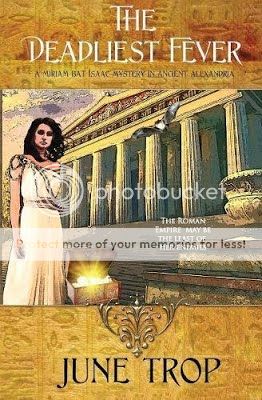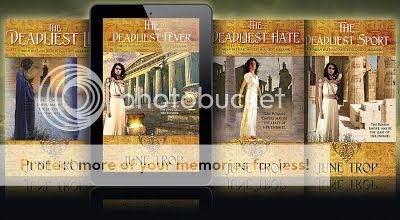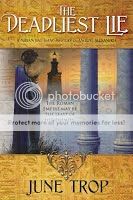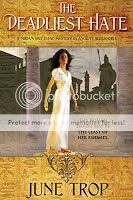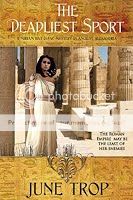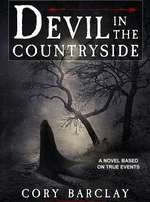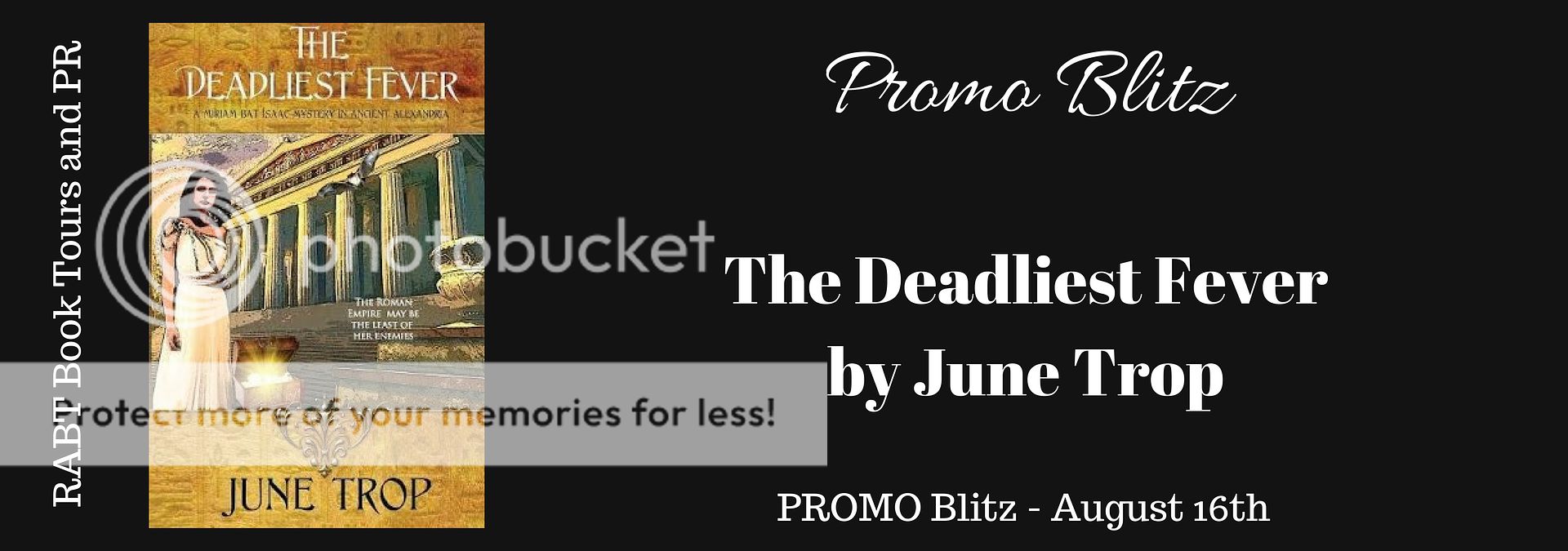
Tag: Historical Fiction Page 3 of 4
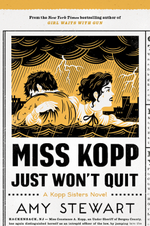 Miss Kopp Just Won’t Quit
Miss Kopp Just Won’t Quit
by Amy Stewart
Series: The Kopp Sisters, #4eARC, 320pg.
Houghton Mifflin Harcourt, 2018
Read: August 8 – 9, 2018

So it’s been roughly a year for Constance Kopp working as the ladies’ matron for the Bergon County Jail. In that time she has investigated crimes, tracked down murderers, sought justice for women of all walks of life, and put her life on the line more than a few times. She’s gained nationwide notoriety, and caused more than a few scandals at home. About now, some of those scandals are coming back and are in the forefront of local elections.
Because of New Jersey law, Sheriff Heath, Constance’s boss and chief defender, cannot run for another term of office without taking one off — so no matter what, after Election Day, Constance will have a new boss. Heath’s former Sheriff is running for the position again, and is the expected winner. He finds the idea of a female deputy silly, and while he won’t take Constance seriously, he’ll probably leave her alone. His opponent is a current detective in the Prosecutor’s office who has been opposing Constance’s position and person since Day 1, he’s essentially running a campaign against Heath (even if Heath isn’t the opponent), and Constance is the easiest way to do that. Clearly, the future isn’t bright for Deputy Kopp.
While this is going on, Constance makes a couple more headlines — she runs down a burglar single-handedly, she jumps into a river to apprehend a potential escapee under their custody when another deputy is injured. Constance has to take a woman to an insane asylum, after her husband and doctor get a judge to commit her for a while. This isn’t the first time this has happened to the woman, and it seems clear to Constance that this woman is as sane as anyone. So Constance attempts to find out what’s behind this commitment so she can free this woman. She’s very aware of the trouble that this could cause for herself and for Sheriff Heath, she tries to do this under the radar. Under the radar isn’t something that comes naturally to her, and her results aren’t stellar (but better than one would expect).
The story was a bit flat, honestly. A lot of things seemed to be foregone conclusions (not necessarily the way that various characters saw them working, either). The one case that she really gets herself into is really pretty tidy and doesn’t take a lot of effort — although she does take plenty of risks. So really, the novel isn’t about Constance sinking her teeth into a case, into helping a woman through some sort of problem, or any of the usual things. This is primarily about Constance worrying that she’ll do something to jeopardize Sheriff Heath’s Congressional campaign by giving his opponents something to harp on, while contemplating her future in the jail under the upcoming term of office for either candidate. Which is fine, really — it’s just not what I’ve come to expect from these books — I expected the case of the poor committed woman to take the bulk of the attention, so the problem is my own. But it comes from being conditioned by the previous books.
Constance’s sisters have a background role in this book — Fleurette in particular, she’s around frequently, but she plays a very small role. I appreciate that she seemed to have her head on straight and wasn’t the cause for trouble (inadvertently or purposely). Norma seemed to primarily be a conduit for comic relief in this novel. But it never feels right to laugh at her, she’s the most practical, she’s the only realist in the family — it’s her blood, sweat and tears that’s kept the family going. On the other hand, her obsessive nature does lead her into some strange preoccupations.
This is not to say it’s a bad book — Stewart is probably incapable of writing a bad book. Miss Kopp Just Won’t Quit feels very different than the others in the series (although, really, each has felt different than the others), and it left me feeling dissatisfied. Still, it was an entertaining and compelling read. The ending is likely the best the series has had thus far — we just have to go through some meandering passages, and some dark times for our favorite Deputy before we get to it. I don’t know what comes next for Constance Kopp (I’m deliberately not consulting anything to tell me, either) — but it’s going to be very interesting to see what Stewart does next.
Disclaimer: I received this eARC from Houghton Mifflin Harcourt via NetGalley in exchange for this post — thanks to both for this.
—–

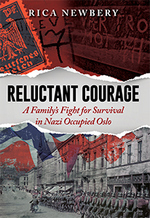 Reluctant Courage
Reluctant Courage
by Rica Newbery
eARC, 234 pg.
BookVenture, 2017
Read: May 5 – 7, 2018

When I don’t like a book (yes, it’s going to be one of those posts), sometimes I’m tempted to describe all the problems I had with the book. And some deserve it. But generally, I don’t want to do that — it seems mean, a lot of this is subjective anyway, and someone poured themselves into their book and why kick them?
So I’ll keep this short and vague.
We’re in Oslo, two years into the Nazi occupation. One thing that’s easy to forget is that even under oppressive governments, life goes on — people love, get married, have kids, go to school, have affairs, abuse substances, and whatnot. Sure, you’ve got to be careful about it — you don’t want to attract the attention of the oppressors or anything, but hey, into each life family turmoil must fall.
Maria and her three daughters (and sometimes her husband) spend so much time bickering and fighting with, or just hurting, each other that it’s almost like they forgot there are Nazi soldiers walking the streets. Sadly, throughout, the antagonism and outbreaks of anger, or sadness, or what have you, don’t feel organic, but rather the results of authorial need. Their lives are filled with poverty, hardship, disease and bitterness — and more than a few attitudes that don’t seem genuine for anyone living tat that point in history (with or without Nazi soldiers on the streets).
I do want to stress that everything that happens is plausible, is possibly based on fact — I’m not commenting on that. It’s the frequently melodramatic way this novel depicts it — it’s just not well-written. Shallow characterization, poor pacing, and strange organization are what dooms this.
There’s one scene that comes out of nowhere that gave me a little hope for the book when someone (who’d basically be depicted as a horrible person) risks life and career to save some Jewish families from arrest. It’s a long time before anything comes from that one scene. I didn’t dislike and/or get put off by the whole book, there was a point that I breathed a sigh of relief — something interesting was finally happening. It was page 148 when I noted that. Sadly, most of what followed (at least the parts that had to do with that event) was hard to believe — and was shoehorned in with a few other storylines for the last 80 pages.
Dull, cliche-filled, aimless, and difficult to believe. Don’t waste your time on this.
Disclaimer: I was given a copy of this book in exchange for my honest opinion.
—–

Revised after being inspired by a comment from Bookstooge to talk about something I really should’ve included initially.
—
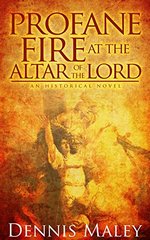 Profane Fire at the Altar of the Lord
Profane Fire at the Altar of the Lord
by Dennis Maley
Kindle Edition, 314 pg.
Jublio, 2018
Read: January 19 – 23, 2018

Infamous papal indulgence-seller, Tetzel is falling out of favor with the German people — which means economic trouble for him, as well as those he’s paying to assist him. One such person is David, a little person (“dwarf” in sixteenth-century eyes), a con man, juggler, and entertainer. He gets himself in some legal trouble and draws upon his dubious ethnicity and a character he played to some success in the past and convinces the court that he’s a member of one of the Lost Tribe of Israel, living in Arabia, sent to Europe to secure partners in a new Crusade. To stay out of legal trouble, he has to embark on a tour of various cities to try to recruit the help of assorted kings, bankers and Bishops of Rome. Along the way, David finds a kindred spirit in Diogo, a womanizing actor hiding out as a deckhand on a merchant ship. Diogo joins David as an assistant, translator, and more.
The backdrop to these antics is a loose survey of early sixteenth-century history of Europe — the politics, diplomacy, and wars the characterize the relations between France, Spain, England, the Holy Roman Empire, German princes, German peasants, and the Popes. As I said, it’s a loose recounting, told mostly in summary form with a conversational tone.
Watching these two lie, deceive and sneak their way through the hearts and purses of Europe is a good time. I could have used a couple of female characters that were better drawn, but David and Diogo are an amusing pair. At one point, a rift between the two arises and one of them begins to believe their own press (among other things) and their lives get more interesting.
Despite the title, there’s really nothing that is satirical about religion — true believers, anyway. David and Diogo are shown as scoundrels throughout. Tetzel’s appearance is fairly matter-of-fact about what he did, Tyndale and Luther are mentioned frequently, but only for what they actually did (true, colored by popular mis-characterizations of their work, but not done to insult/defame/mock them). The various Popes and Cardinal Wolsey are discussed in terms of their political machinations (mostly having to do with becoming/staying Pope). When it comes to people of actual religious belief (Lutheran, Roman Catholic, Jewish or Kabbalistic), Maley is pretty-hands off, he doesn’t comment at all about the belief — yeah, several people are duped by these scoundrels, but that doesn’t mean that their faith isn’t real.
In the Acknowledgements, the author states that this “book’s purpose is to entertain. The standard of its scholarship is low. I am not a historian.” It’d be nice if that came before the text, so I didn’t spend so much time hemming and hawing about some of the history/depictions of historical characters.
Actually, now that I mention it — this novel would’ve been stronger without all the historical ramblings — yes, they were amusingly told. But it added nothing to the story. Not just because as a reader, you need to take his history with a generous helping of salt; but all the history primarily served to distract the reader and detract from the story of these con men. Yes, some of it — some — was helpful for some context, but the other 97-95% of the historical material could have been excised to help the rest of the novel.
Nevertheless, this was a funny story with some amusing characters. This wasn’t a typical religious-fraud satire, although it easily could’ve been — and that’s to be commended. Like many satires, Maley had some trouble toward the end and the plot threatened to get away from him — but he was able to bring things back into shape by the conclusion, which is a pretty neat trick, too. Flawed, but entertaining, it’s worth a shot.
Disclaimer: I received this book from the author in exchange for my honest opinion in this post. I thank him for the shot.
—–

 |
✔ Read a self published book. |
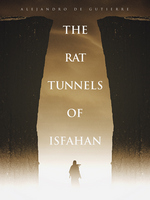 The Rat Tunnels of Isfahan
The Rat Tunnels of Isfahan
by Alejandro de Gutierre
Series: Scorpions and Silk, #1Kindle Edition, 75 pg.
De Gutierre, 2017
Read: November 9, 2017

I wasn’t crazy. Not like most of the tortured souls I shared the prison with. Some wandered, muttering and bumping into walls. Some sat unmoving for hours, staring into a darkness even the desert sun couldn’t penetrate, their eyes seeing but not seeing, ears hearing but not listening. And a sad few would break; they would weep, and rock, and cry out. These were the broken: shuffling from place to place, barely eating, barely drinking, numbly watching the flesh drip from their bones, oblivious to the blood slowing in their veins.
We know very little about the central (practically only) character in this novella — he’s a prisoner, somewhere in Persia, sometime long ago. That’s about all that we know — for that matter, that’s about all he knows. His imprisonment has left him so psychologically shattered that he can’t remember anything about himself. He has children somewhere, he thinks.
We see him struggle to survive, struggle to get free, struggle to convince himself that he’s not crazy, and return to/rebuild his life. I don’t know much about him, but I like him, and I want to see the best for him.
I don’t think it’s possible for the word “visceral” to show up more in my notes for a 75-page novella than it did here. You feel this story as much as you read it — the almost-alien creepiness of a scorpion, the isolation, the fear, the rat chewing on a toe — all of it, de Gutierre puts you right in the mind of his amnesiac (his having no name helps there).
Until this story spools out a bit more — maybe volume 2, maybe until the end — I’m not sure what I think of the story, plot or characters. I can tell you that I want to know these characters better, I want to find out what happens to them, but that’s as far as I can say on that front. So, I’m left with de Guiterre’s writing — which is just what this story needs. He knows what he’s doing, and has got me hooked, even if I don’t have a clue about what he’s doing. This atmospheric, visceral read will leave you demanding more, soon.
Disclaimer: I received a copy of this novella from the author in exchange for my honest opinion — and I’m glad he gave it to me, because I wouldn’t have heard of it otherwise.
—–

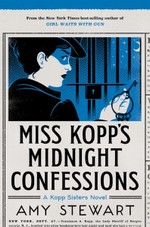 Miss Kopp’s Midnight Confessions
Miss Kopp’s Midnight Confessions
by Amy Stewart
Series: The Kopp Sisters, #3
eARC, 384 pg.
Houghton Mifflin Harcourt, 2017
Read: August 15 – 16, 2017

Without meaning to slight Girl Waits with Gun or Lady Cop makes Trouble, this is the best constructed novel in this series. There’s a unity of theme, stories that complement each other, and a level of (honest) introspection from the characters that we haven’t seen before. That said, I don’t think I enjoyed it nearly as much as I did the others. So it’s a little bit of a trade-off.
We are treated to three stories of young women, one sixteen year-old and two eighteen year-olds, who leave home for various reasons. They all want something more than they can have at home — meaning, a job, excitement, freedom, and maybe something more. One girl did everything right, but sill was arrested for waywardness. One was pretty foolish, and did some illegal things, but was really arrested for the foolish mistake. The third was Constance’s little sister, Fleurette. Constance went to bat for all three — interceding with the law (when applicable), with family (when she could), trying to give them the ability to live the life they wanted to — and each of them pressed Constance’s ability, job and standing as she did so.
While this is going on, Constance is making headlines across the nation — making her both a distraction to her friend the Sheriff, as well as a voice for social change. I know she regrets the former, and I’m not convinced she relishes the latter. If she had her druthers, I think Constance would prefer just to do her job and be left alone. But she is learning how to use her notoriety — or at least her relationship with members of The Press — to help her accomplish her goals.
Constance begins to come to terms with some very unfortunate realities of her life, and begins to grasp what the future may hold for her, both professionally and personally. In some way (I think), she thought she could keep the life she had and just add on her job on top of it. But between her fame, the time she spends away from the home, Fleurette’s aging and getting ready to leave the nest, and everything else going on around the sisters, that’s no longer possible. Her old life is gone, and the new one is too in flux for her to get a handle on it. Assuming that there are more Kopp Sister novels to come, watching Constance figure out what her life will be — and hopefully she gets a hand in shaping it — will be the key to the series as it progresses.
On the whole, this one didn’t work as well for me as the previous books did. But several of the individual elements I found compelling and wanted more of — I wish we got more of the story about Edna Heustis (I don’t need to know what happened over the rest of her life, I just want a clearer picture of the next few months) or her roommate. I’d have liked more interaction between Constance and her boss — we just didn’t get enough of them — and an honest conversation about the future would’ve been nice. I did think the ending of the Fleurette story was handled perfectly — I don’t think I’d change a thing about that whole storyline, really. Still, this novel was somehow less than the sum of its parts, for me — but I can easily see where I’ll be in the minority for thinking that. I’m not saying I didn’t enjoy it, I just should’ve enjoyed it more.
Strong characters, some strong themes (ones you usually don’t see in Detective fiction), and a tumultuous time period (for several reasons) combine to deliver another satisfying entry in this series that’ll please existing fans and probably pick up a few more.
Disclaimer: I received this eARC from Houghton Mifflin Harcourt via NetGalley in exchange for this post — thanks to both for this.
—–

Sometime in the reading of this novel, it occurred to me that I don’t think I’ve ever read a novel about life on the frontier (American or, now, Australian) written with a male as the central character — Laura Ingalls, Caddie Woodlawn, a few others I can’t think of the names of, all female. Clearly, that’s not that important, and even more clearly, I’ve not read deeply in this area — I just found it odd.
—
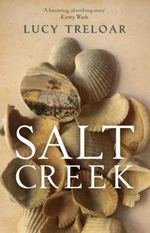 Salt Lake
Salt Lake
by Lucy Treloar
Kindle Edition, 464 pg.
Aardvark Bureau, 2015
Read: August 29 – 31, 2017

Memories are just the survivors of complete events and are not easy to interpret; in the recalling they can be used to create a story that is only partially true or not true at all.
It’s the mid-1850’s and Hester Finch and her family are settling in the Coorong region, after her father’s finances fall apart in Adelaide (which follows them falling apart elsewhere before). This is clearly their last chance, but with some luck and determination, they should be able to survive — even if they can’t rebuild their fortunes enough to return to town. It’s too much of a step down for their mother, who seems ill-equipped for Australia at this time, much less the Coorong, and Hester has to step up and shoulder more responsibilities for the running of the household and the raising/educating of her younger siblings.
Her father sees himself as a businessman, an entrepreneur, but it doesn’t seem that his abilities match his ambitions/self-estimation. He’s a strong and pious Quaker, with some fairly (for his time) progressive ideas about the status and nature of the natives. Yes, he wants to help them via Western Civilization and Christianity (whether they want it or not), but he doesn’t see them in the same way that many others (including some of this sons) do. At least not in the beginning of the novel — things continue to not go well for him (I’m being purposefully vague here), and as that happens the broken man inside him is revealed or his ideals and hopes are shattered and something else emerges. He becomes the villain of the piece, or one of the many victims of the environment — I quite enjoy the fact that I could argue either way on that.
Space and patience (yours and mine) prevent me from talking about all of Hester’s siblings (there are several) and the others they come into contact with, so I’ll sum up by saying within and without the family display a wide swath of humanity, the good and the bad (and the worst) we have to offer. There is a native (Hester’s word), Tull, who lives around the Finch home that is befriended by the family, who comes to occasionally live with them, work alongside them, is educated with them — and becomes part of the family. Much of the plot revolves around or comes from his presence, his interactions with the Finches and others. Treloar handles the character well — Tull’s not perfect, not all-wise, or a paragon, or anything. He’s just as flawed as the rest of the people in this book (well, maybe a little less flawed than some).
This will be seen primarily as a story about love, or about the clash of native cultures and Western colonization in the harshness of pioneer life, or something along those lines. To me, the recurring theme was pride (I’m not sure the word was used all that much, but man, it was all over the place). People broken by pride, motivated by pride, people corrupted by pride, people blocked by pride — I could probably go on. I don’t think of one thing in this book that was motivated by pride that went well — it was only when pride was ignored or set aside — for love, for the sake of another — does anything actually go well (this applies to Hester post-Coorong, too). It was subtle, but it was profound.
There are enough references to Jane Eyre that the reader is forced to draw lines of comparison/contrast between Jane and Hester (and maybe some of the others, as well). This is a nervy thing for an author to do (not just to Jane Eyre, but any classic of that stature), and it rarely works out well for the newbie. I’m not saying the comparisons are invalid, I just am not sure that Treloar should’ve pushed it. One mention of the book — maybe two (her receiving a new copy and reading it in secret) would’ve been enough just to see that Hester draws some inspiration from the literature she’s exposed to.
There are passages from this book that rank right up there with some of the best I’ve read this year — one scene where Hester is overcome with grief and a sense of futility that’ll just wreck your heart. There’s another involving an injury on the farm and Hester’s tending to the wound (including some stitches), that just curled my toes — really, give me Thomas Harris describing one of Lecter’s snacks rather than make me read that again.* When it comes to pain and hardship, Treloar can write with the best of them.
But I’m not totally taken with her as an author. Early on, Treloar jumps around chronologically between the early months in The Coorang and to various periods of Hester’s time in England as an adult. I didn’t see the point to this move, unless she was going to continue that as a way to develop the story. But she stops that for several chapters, abandoning the future until the last three chapters — when it fits easily. I didn’t see the point to it, it muddied the waters a little and made it hard for me to get invested in what was happening in the 1850s.
And that ties in with my biggest problem with the book — I couldn’t get interested until slightly after the 50% mark. I really wasn’t even that curious about anyone at that point, it was just a matter of me pushing on, wondering if I’d ever get invested. Thankfully, I did. Somewhat, anyway. But that it took so long for me to care about the things that were happening — much less the people they were happening to/because of, says something about the book. There’s a lot to be said for an author taking time to establish the world she’s writing in, to develop the characters slowly, patiently — I’m all for that when it’s done well. But it’s so much easier to appreciate when I’m given a reason to keep reading beyond wanting to finish a book.
Once I did make that connection — my enjoyment of and appreciation for the book ratcheted up. I don’t think the pacing changed at this point (maybe it picked up a little bit), but everything she’d spent 52% or so of the book setting up was set up, so with all the causes in place, the effects started and that was much more engaging.
Regardless, there were some killer sentences (even in the first half) in this book, demonstrating that Treloar has the right stuff. I think she could do more with it than she has, and would like to see more from her in the future. On the whole, this is a good read — and I can easily see where some will enjoy it more than me (I can almost bet those who do are engaged more than I was during the first half), a gritty, stark examination of pioneer living in the mid-19th century with just a hint of hope. Recommended.
—
* I will always take blood and guts and gore that are clearly fantastic over those that really happened or are close enough to reality to have probably happened several times.
Disclaimer: I received a copy of this book from the publisher in exchange for this post and my honest opinion.
—–

 Miss Kopp’s Midnight Confessions
Miss Kopp’s Midnight Confessions
by Amy Stewart
Series: The Kopp Sisters, #3eARC, 384 pg.
Houghton Mifflin Harcourt, 2017
Read: August 15 – 16, 2017

Without meaning to slight Girl Waits with Gun or Lady Cop makes Trouble, this is the best constructed novel in this series. There’s a unity of theme, stories that complement each other, and a level of (honest) introspection from the characters that we haven’t seen before. That said, I don’t think I enjoyed it nearly as much as I did the others. So it’s a little bit of a trade-off.
We are treated to three stories of young women, one sixteen year-old and two eighteen year-olds, who leave home for various reasons. They all want something more than they can have at home — meaning, a job, excitement, freedom, and maybe something more. One girl did everything right, but sill was arrested for waywardness. One was pretty foolish, and did some illegal things, but was really arrested for the foolish mistake. The third was Constance’s little sister, Fleurette. Constance went to bat for all three — interceding with the law (when applicable), with family (when she could), trying to give them the ability to live the life they wanted to — and each of them pressed Constance’s ability, job and standing as she did so.
While this is going on, Constance is making headlines across the nation — making her both a distraction to her friend the Sheriff, as well as a voice for social change. I know she regrets the former, and I’m not convinced she relishes the latter. If she had her druthers, I think Constance would prefer just to do her job and be left alone. But she is learning how to use her notoriety — or at least her relationship with members of The Press — to help her accomplish her goals.
Constance begins to come to terms with some very unfortunate realities of her life, and begins to grasp what the future may hold for her, both professionally and personally. In some way (I think), she thought she could keep the life she had and just add on her job on top of it. But between her fame, the time she spends away from the home, Fleurette’s aging and getting ready to leave the nest, and everything else going on around the sisters, that’s no longer possible. Her old life is gone, and the new one is too in flux for her to get a handle on it. Assuming that there are more Kopp Sister novels to come, watching Constance figure out what her life will be — and hopefully she gets a hand in shaping it — will be the key to the series as it progresses.
On the whole, this one didn’t work as well for me as the previous books did. But several of the individual elements I found compelling and wanted more of — I wish we got more of the story about Edna Heustis (I don’t need to know what happened over the rest of her life, I just want a clearer picture of the next few months) or her roommate. I’d have liked more interaction between Constance and her boss — we just didn’t get enough of them — and an honest conversation about the future would’ve been nice. I did think the ending of the Fleurette story was handled perfectly — I don’t think I’d change a thing about that whole storyline, really. Still, this novel was somehow less than the sum of its parts, for me — but I can easily see where I’ll be in the minority for thinking that. I’m not saying I didn’t enjoy it, I just should’ve enjoyed it more.
Strong characters, some strong themes (ones you usually don’t see in Detective fiction), and a tumultuous time period (for several reasons) combine to deliver another satisfying entry in this series that’ll please existing fans and probably pick up a few more.
Disclaimer: I received this eARC from Houghton Mifflin Harcourt via NetGalley in exchange for this post — thanks to both for this.
—–

 Blackbeard’s Daughter
Blackbeard’s Daughter
by Diana Strenka
Kindle Edition, 199 pg.
2016
Read: October 6 – 7, 2016

Edward Teach had a rough childhood dominated by a harsh, abusive, taskmaster of a father. He eventually grows to manhood, marries and takes over the family estate — as soon as he can, he takes his wife and daughter to the New World and the freshly established colonies.
The focus of this story turns to his daughter, Margaret — and she has a rough crossing of the Atlantic, and doesn’t take to the New World too well. It’s a dramatic time for British settlers — battles with the natives and others disrupt the lives of the Teaches in dramatic fashion, death, injury, and loss of home and income. Margaret’s world is turned upside down several times, the last time when her father starts going to sea for months at a time, only turning up unexpectedly.
She eventually learns that he’s the pirate Blackbeard (not really a spoiler folks, look at the title) and goes to sea with him for a while. Almost none of this part of the novel works — and when it ends, it’s almost a relief.
There’s a plotline about Margaret and her efforts to help free slaves that’s sentimentally nice, but doesn’t seem to ring true and doesn’t really go anywhere.
I have no idea how close any of this novel comes to matching historical data, it has a ring of authenticity augmented by imagination, but I can’t be sure.
Everything almost worked — almost — but I can’t think of anything that actually did. There’s an earnestness to the text that will draw you in and make you root for the author, but that’s really the best I can say.
Disclaimer: I received this book from the author in exchange for this post and my honest opinion. Sorry.
—–



